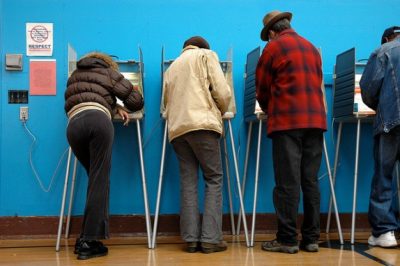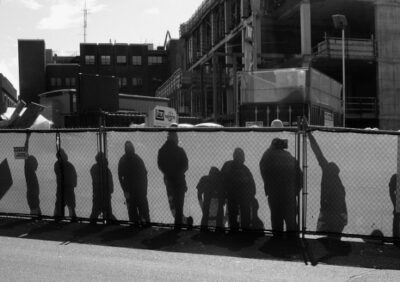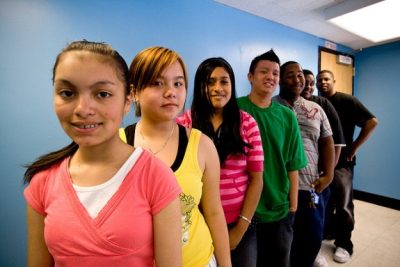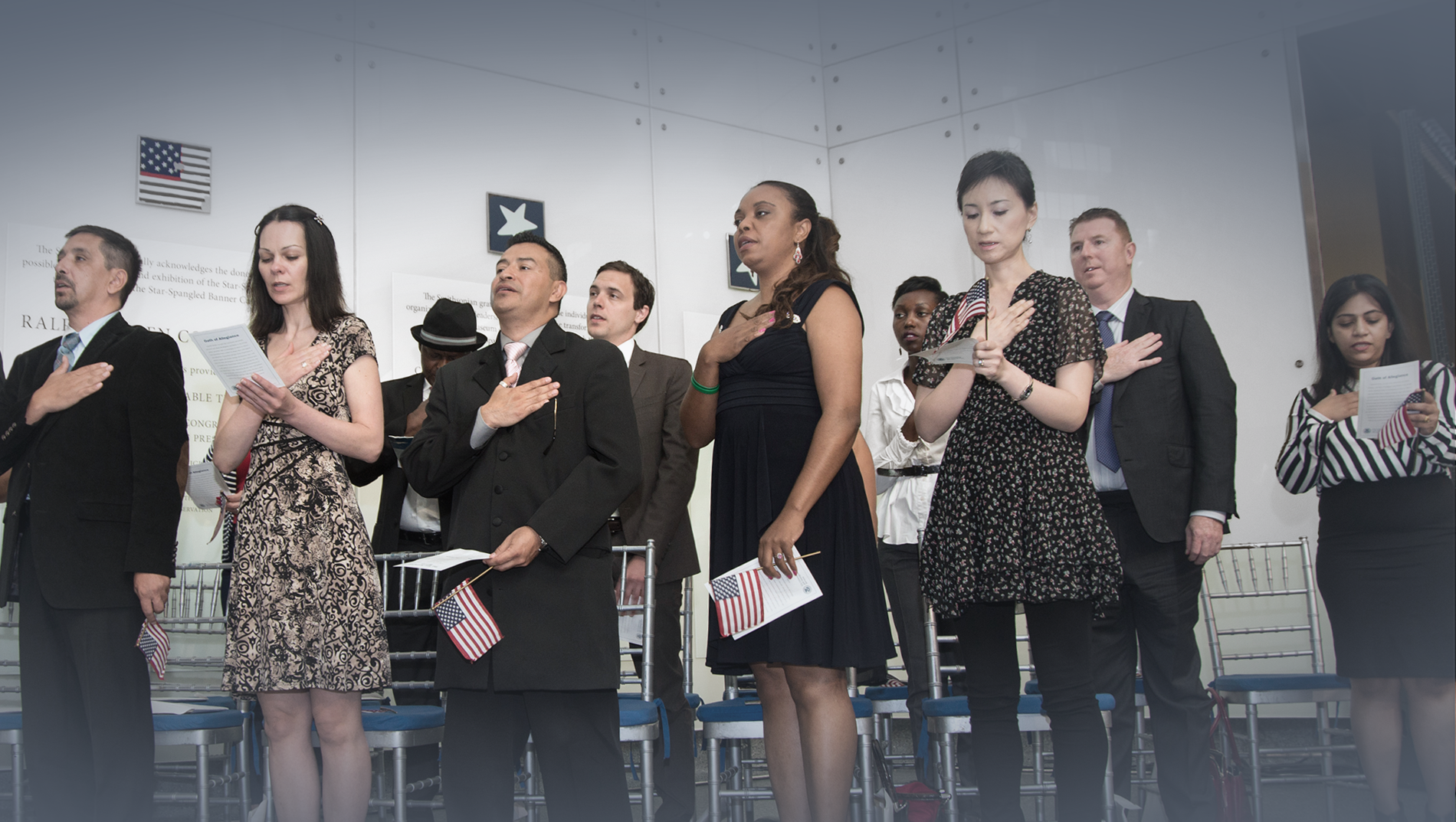Immigration 101
The U.S. immigration system is complex and can be difficult to understand. These resources provide key data points, historical information, and background on hot topics in immigration. Learn the basics about immigration. Immigration in the United States is complex and ever-evolving. Start here to understand the fundamental aspects of immigration policy, its history, and its impact on both individuals and the country at large. Learn commonly used terms about immigration law and how the U.S. immigration system is designed. Explore layered topics like how and whether immigrants can become citizens, as well as what individual protections look like under the law.
How the United States Immigration System Works
- How the Immigration System Works
- June 24, 2024
U.S. immigration law is very complex, and there is much confusion as to how it works. This fact sheet provides basic information…
Read More
Birthright Citizenship in the United States
- Birthright Citizenship
- October 16, 2024
This fact sheet explains birthright citizenship, the Fourteenth Amendment, and its interpretations. Who is…
Read More
Asylum in the United States
- Asylum
- August 27, 2014
Asylum seekers must navigate a difficult and complex process that can involve multiple government…
Read More
Number of Potential Immigrant Voters on the Rise in Key Super Tuesday States
Three of the twelve states holding Republican primaries or caucuses on Super Tuesday—Georgia, Massachusetts and Virginia—show especially strong trends in the numbers of foreign-born residents who have become U.S. citizens. This trend is significant given that these new Americans are able to register and vote. Immigrant communities in each of these states are large, exceeding 800,000 persons, and make up almost 10% or more of the statewide population. In fact, these three states are home to 71% of all immigrants living in the Super Tuesday states. While we don’t yet know how many of these naturalized U.S. citizens will vote on Super Tuesday or in the general election, GOP presidential candidates—many of whom have taken a hard line on immigration—would do well to take note of this trend. Read More

Number of Potential Immigrant Voters on the Rise in Key Super Tuesday States
Three of the twelve states holding Republican primaries or caucuses on Super Tuesday—Georgia, Massachusetts and Virginia—show especially strong trends in the numbers of foreign-born residents who have become U.S. citizens. This trend is significant given that these new Americans are able to register and vote. Immigrant communities in each of these states are large, exceeding 800,000 persons, and make up almost 10% or more of the statewide population. In fact, these three states are home to 71% of all immigrants living in the Super Tuesday states. While we don’t yet know how many of these naturalized U.S. citizens will vote on Super Tuesday or in the general election, GOP presidential candidates—many of whom have taken a hard line on immigration—would do well to take note of this trend. Read More

New Report Debunks Myth of Self-Deportation
Faced with harsh anti-immigrant laws passed by state or local governments, most unauthorized immigrants do not return to their home countries. That is the inescapable conclusion of a new report from the Center for American Progress (CAP), entitled Staying Put but Still in the Shadows, by Leah Muse-Orlinoff. The report finds that unauthorized immigrants react to anti-immigrant laws by moving to a different county or state, or by staying right where they are and isolating themselves even further from the larger society. In other words, GOP presidential contender Mitt Romney was wrong when he argued that a “self deportation” solution to the problem of unauthorized immigration might actually work. Read More

New Data Highlights Immigrant Integration and Economic Contributions
A recent analysis of data from the Census Bureau highlights the degree to which immigrants integrate into U.S. society and contribute to the U.S. economy. In its latest statistical profile of the foreign-born population, the Pew Hispanic Center presents statistics which illustrate that most immigrants have been here for more than a decade, more become homeowners the longer they are here, and growing numbers are becoming U.S. citizens. Moreover, the data show the degree to which immigrants fuel labor-force growth and fill valuable roles in the economy as workers in both high-skilled and less-skilled occupations. Read More

A New Way to Measure the Burgeoning Power of the Immigrant Vote
Voter registration is a key measure of immigrant integration. After all, what could be more American than casting your ballot on Election Day? When measuring immigrant voting patterns, voter registration is typically defined as the percent of naturalized immigrants (those who have become U.S. citizens) who are registered to vote. In other words, we only look at those currently eligible to vote because they have naturalized, instead of looking at the percentage of naturalized registered voters against all immigrants, documented or undocumented. The problem with that approach is we miss a big and important picture on the potential of the immigrant voting block—that many of those not eligible now, may well be eligible in the future. Read More

Retiring Baby Boom Generation Will Rely on Immigrant, Hispanic Workforce
The U.S. population is rapidly growing older, which is having a dramatic impact on the U.S. labor force. The far-reaching effects of this demographic transformation are very much apparent in the projections released in January by the Bureau of Labor Statistics (BLS). As explained by Rakesh Kochhar of the Pew Hispanic Center, the BLS numbers indicate that “the aging of the non-Hispanic white population is expected to reduce their numbers in the labor force.” At the same time, “the Hispanic population is growing rapidly due to births and immigration.” For those reasons, says Kochhar, the BLS projections indicate that Latinos “will account for three-quarters of the growth in the nation’s labor force from 2010 to 2020.” Read More

The Future of a Generation: How New Americans Will Help Support Retiring Baby Boomers
The United States is in the midst of a profound demographic transformation that will long outlast the current economic downturn. In 2011, the first of the baby boomers—Americans born between 1946 and 1964—turned 65 years old. There are 77 million baby boomers, comprising nearly one quarter of the total population, and their eventual retirement will have an enormous impact on the U.S. economy. This daunting fact is central to the January 2012 employment and labor force projections from the Bureau of Labor Statistics (BLS). As the BLS projects, the retirement of the baby boomers will slow labor force growth significantly over the coming decade. Yet, at the same time, demand will grow for new workers to take the place of those who retire from the labor force, as well as for both highly skilled and less-skilled healthcare workers to look after the growing ranks of elderly Americans. In addition, the Social Security and Medicare programs will be called upon to serve a rapidly growing number of older Americans, which will leave American taxpayers hard pressed to fund those programs with their tax dollars. Read More

GOP Candidates Ignore Florida’s Diversifying Latino Population
Campaigning in Florida this month, GOP Presidential candidates continued to display a general lack of understanding of the state’s diversifying Latino population. While it’s well-documented that the Cuban-American population is currently a strong political force, the emerging story in Florida is that the state’s future voting population will become increasingly Latino, but less Cuban. Read More

Nativist Group Twists Facts on Effectiveness of Arizona’s Immigration Law
The Federation for American Immigration Reform (FAIR) has outdone itself when it comes to shoddy research. In a recently released report on “demographic changes” in Arizona, FAIR utilizes an almost random assortment of statistics to make its case that the state’s unauthorized immigrants are fleeing in droves thanks to get-tough immigration policies. The report occasionally pays lip service to the impact on unauthorized immigration of the 2008-2009 recession, as well as persistently high unemployment rates that continue to this day. Yet FAIR concludes, without evidence, that state-level immigration enforcement has been the single most important factor causing the decline of the unauthorized population. In reality, this conclusion is not supported by the data which FAIR presents. Read More
Make a contribution
Make a direct impact on the lives of immigrants.

